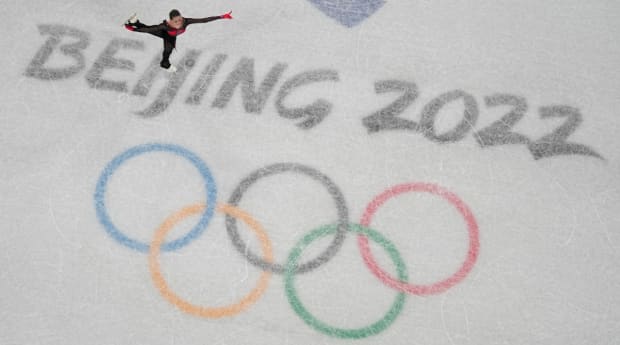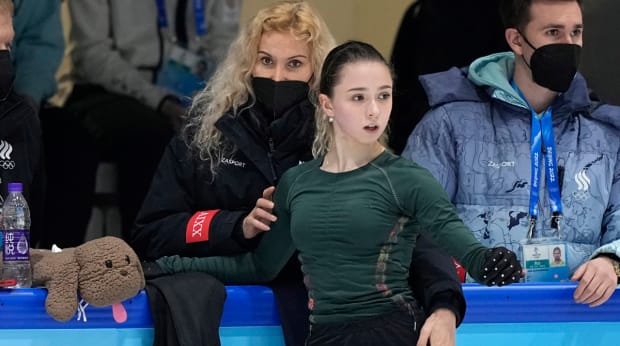BEIJING – Today’s Olympic doping update: Russians are not supposed to take drugs, but they can give them to their kids. That is not a joke. Well, it is. But it’s not supposed to be.
The Court of Arbitration for Sport (CAS) decided skater Kamila Valieva can continue to compete in figure skating at the Olympics despite taking a banned heart medication because, according to the IOC, Valieva is a “protected person.” I figured Valieva is protected because she is Russian, but it turns out, it’s because she is 15.
Basically: She is too young for her drug use to be her fault, so carry on. So now, Valieva gets to keep her gold medal from the team competition and perform in the singles competition, and if Russia puts amphetamines in her breakfast and springs in her skates, you can expect the IOC to respond with a look of moderate disappointment.
The IOC continues to fulfill its dual mission of staging one of the world’s great sporting events, then screwing it up. We can (and perhaps should) have a robust discussion about whether 15-year-olds should be allowed to compete in Olympic figure skating, but I think we can all agree: If you let them compete, they need to compete by the same rules. When Katie Ledecky swam in London in 2012 at 15, nobody shortened the pool for her.

Jeff Roberson/AP
After announcing the ruling, CAS director general Matthieu Reeb took no questions, which is too bad because the first one would have been, “WHAT THE HELL IS WRONG WITH YOU?” The second one would have been about why he needs director and general in his title. The third would have been about the mess the IOC and CAS have created by repeatedly botching their handling of Russia’s state-sponsored doping.
The IOC originally banned Russia from competition in 2017, then gradually removed any teeth from that decision. In ’18, the World Anti-Doping Agency (WADA) announced Russia was “fully reinstated.” Then in ’19, WADA banned Russia again.
There have been Russians at every Olympics since the “ban.” Russians are officially competing here under neutral uniforms, but that means about as much as your favorite NBA team wearing City Edition uniforms. It’s still the same team. Putting four Russians in a bobsled and claiming it doesn’t matter that they’re all Russian is beyond silly.
In 2017, the IOC announced that Russia’s government officials would be forbidden from attending the Games. Yet, Russian president Vladimir Putin attended the opening ceremony here. He was seen nodding off, or pretending to, when Ukraine was introduced.
Whether banning Russia in the first place was fair or not, the goal behind it was simple: The IOC had to take a stand against state-sponsored doping. But it has done so in such a haphazard and incompetent fashion that the goal got lost. Now, here is CAS, essentially ruling that Valieva can continue to compete because this is probably just state-sponsored doping. She is just a minor and therefore “protected.”
CAS also ruled that the Russian Anti-Doping Agency (RUSADA) and World Anti-Doping Code clearly have different standards of evidence and lower sanctions for “protected persons,” but are “silent with respect to provisional suspension imposed on protected persons.”

David J. Phillip/AP
Letting RUSADA decide the standard is like letting mob bosses make racketeering laws. But the IOC and CAS have repeatedly given Russia the latitude it does not deserve. According to the International Testing Agency, Valieva submitted a test on Dec. 25 during the Russian national championships. Her sample was not run until Feb. 7, after she won gold here.
Well, hey, stuff happens. You open your Christmas gifts, you’re excited, and you forget to run a drug test for seven weeks. It happens to the best of countries.
When Valieva tested positive on Feb. 7, RUSADA suspended her provisionally. She requested a hearing. RUSADA unsuspended her. That put the case in CAS’s hands, and CAS dropped it and ran away.
The situation is pretty obvious to anybody who wants to see it. The Russian doping program came to light after the 2014 Olympics in Sochi, and eight years later, Russia is still a rogue Olympic state, doing what it pleases because it can. The IOC and CAS never dealt with this properly before. Why would they do it now?
In the middle of all this is a 15-year-old kid who skated extraordinarily well and probably would have done so even if she hadn’t taken drugs. There is no way to know, of course, and yes: The rules are the rules. But Valieva is almost certainly a victim here, too. She should be competing cleanly. The IOC and CAS failed her, just as they failed the rest of the world. There are thousands of Olympians who should, in the most fundamental sense, be protected people. What does the IOC tell them?







